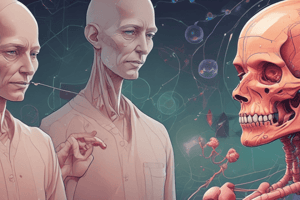Podcast
Questions and Answers
What is the main characteristic of cancer?
What is the main characteristic of cancer?
- Uncontrolled growth and spread of abnormal cells (correct)
- Abnormal cell death
- Inflammation of tissues
- Autoimmune response
Which type of cancer arises from epithelial cells?
Which type of cancer arises from epithelial cells?
- Leukemias
- Carcinomas (correct)
- Lymphomas
- Sarcomas
What is a major environmental factor that increases cancer risk?
What is a major environmental factor that increases cancer risk?
- Regular exercise
- High-fiber diet
- Tobacco smoking (correct)
- Prolonged sun exposure
At which stage of cancer is the tumor localized?
At which stage of cancer is the tumor localized?
What is the main goal of primary prevention in cancer?
What is the main goal of primary prevention in cancer?
What is the purpose of a biopsy in cancer diagnosis?
What is the purpose of a biopsy in cancer diagnosis?
What type of therapy uses high-energy radiation to kill cancer cells?
What type of therapy uses high-energy radiation to kill cancer cells?
What is the purpose of a screening test in cancer prevention?
What is the purpose of a screening test in cancer prevention?
Study Notes
Definition and Classification
- Cancer: a group of diseases characterized by the uncontrolled growth and spread of abnormal cells
- Classified into several types based on the tissue or organ of origin:
- Carcinomas: arise from epithelial cells (e.g., breast, lung, colon)
- Sarcomas: arise from connective tissue cells (e.g., bone, cartilage, fat)
- Leukemias: arise from blood cells
- Lymphomas: arise from immune system cells
Causes and Risk Factors
- Genetic mutations: inherited or acquired, can increase cancer risk
- Environmental factors:
- Tobacco smoking
- Radiation exposure
- Viral infections (e.g., HPV, HIV)
- Chemical carcinogens (e.g., asbestos, benzene)
- Lifestyle factors:
- Poor diet
- Physical inactivity
- Obesity
- Infection with certain bacteria (e.g., H. pylori)
Stages and Progression
- Staging: classification of cancer based on extent of tumor growth and spread
- Stage I: localized tumor
- Stage II-IV: increasing tumor size and spread to lymph nodes and distant organs
- Progression: cancer cells can invade nearby tissues, enter bloodstream or lymphatic system, and metastasize to distant organs
Diagnosis and Treatment
- Diagnosis: biopsy, imaging tests (e.g., X-ray, CT, MRI), and laboratory tests (e.g., blood markers)
- Treatment options:
- Surgery: removal of tumor and surrounding tissue
- Chemotherapy: drugs to kill cancer cells
- Radiation therapy: high-energy radiation to kill cancer cells
- Targeted therapy: drugs that target specific cancer cells or proteins
- Immunotherapy: stimulation of immune system to fight cancer
Prevention and Screening
- Primary prevention: avoid or reduce exposure to risk factors
- Secondary prevention: early detection and treatment of cancer
- Screening tests:
- Mammography (breast cancer)
- Colonoscopy (colorectal cancer)
- Pap smear (cervical cancer)
- Prostate-specific antigen (PSA) test (prostate cancer)
Definition and Classification
- Cancer is characterized by uncontrolled growth and spread of abnormal cells.
- Classified into four main types based on tissue or organ of origin:
- Carcinomas: arise from epithelial cells, e.g. breast, lung, and colon cancer.
- Sarcomas: arise from connective tissue cells, e.g. bone, cartilage, and fat cancer.
- Leukemias: arise from blood cells.
- Lymphomas: arise from immune system cells.
Causes and Risk Factors
- Genetic mutations, inherited or acquired, can increase cancer risk.
- Environmental factors that increase cancer risk:
- Tobacco smoking.
- Radiation exposure.
- Viral infections, e.g. HPV and HIV.
- Chemical carcinogens, e.g. asbestos and benzene.
- Lifestyle factors that increase cancer risk:
- Poor diet.
- Physical inactivity.
- Obesity.
- Infection with certain bacteria, e.g. H. pylori.
Stages and Progression
- Cancer staging classifies cancer based on tumor growth and spread.
- Stages of cancer:
- Stage I: localized tumor.
- Stage II-IV: increasing tumor size and spread to lymph nodes and distant organs.
- Cancer cells can invade nearby tissues, enter bloodstream or lymphatic system, and metastasize to distant organs.
Diagnosis and Treatment
- Diagnosis of cancer involves:
- Biopsy.
- Imaging tests, e.g. X-ray, CT, and MRI.
- Laboratory tests, e.g. blood markers.
- Treatment options for cancer:
- Surgery: removal of tumor and surrounding tissue.
- Chemotherapy: drugs to kill cancer cells.
- Radiation therapy: high-energy radiation to kill cancer cells.
- Targeted therapy: drugs that target specific cancer cells or proteins.
- Immunotherapy: stimulation of immune system to fight cancer.
Prevention and Screening
- Primary prevention of cancer involves avoiding or reducing exposure to risk factors.
- Secondary prevention of cancer involves early detection and treatment.
- Screening tests for cancer:
- Mammography for breast cancer.
- Colonoscopy for colorectal cancer.
- Pap smear for cervical cancer.
- Prostate-specific antigen (PSA) test for prostate cancer.
Studying That Suits You
Use AI to generate personalized quizzes and flashcards to suit your learning preferences.
Description
Explore the classification of cancer into different types based on tissue or organ of origin, including carcinomas, sarcomas, leukemias, and lymphomas, and learn about genetic mutations and risk factors.




